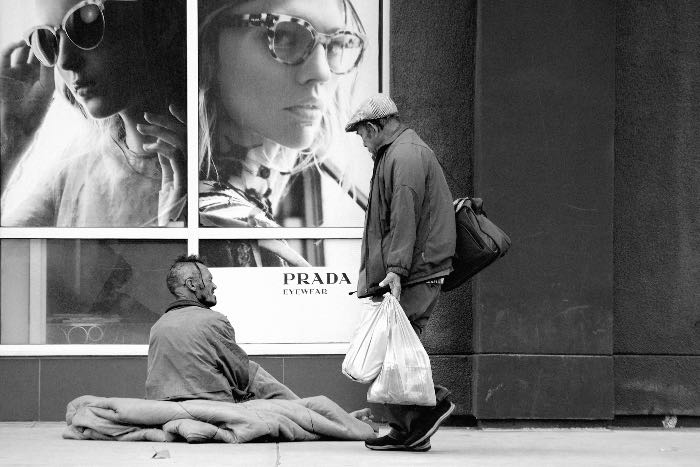
This Week: Proper 29A
Gospel: Matthew 25:31-46
Jesus concludes his teaching at the Temple with a kind of story. It’s not a parable exactly. Something more like a prophecy. The kind we find in the prophets more than fortunetellers. Something between unnerving and comforting. A paradox of discordance that also sounds…right.
At the end, the king will separate us all. A great sort between the good and the bad. And the good will find everlasting comfort. The bad…the opposite.
As I reflected earlier in the week, this fits too neatly into the American Christian binary: where we love to classify good and evil so we can reward and punish with great abundance!
Of course, because of our desire to catalog—the blessed need to order ourselves, our neighbors, and our communities—are we more interested in unlocking the secret of the universe than in listening to Jesus?
What is Jesus saying?
He says that, in the end, when everything is done, there is a fundamental question of life.
Did we serve Jesus?
And the way we know we’ve served him?
We served people in their need.
This is the heart of serving Christ—serving our neighbors.
And not just any neighbors. People in need. The poor, hungry, imprisoned, etc. By meeting their needs, we meet Jesus’s needs.
This is the culmination of Jesus’s teachings.
Everything is in this. It rhymes with the Sermon on the Mount, the teachings about the Kin-dom, and the Great Commandment. It really feels like it is built on everything that came before.
Which also means that anyone who has heard this stuff should have what they need to understand it. And more importantly, do it.
Do or be?
There is one other aspect of the story that puts pressure on our usual mindsets. The tension we enter the passage with: who is good and who is bad: is built on a “be” paradigm. That it matters who we are and not, say, what we do. Mainly because our “do” choices become a matter of who we are.
Did you steal something? We say you are a thief.
The permanence we place, not on the action itself, but on our character is incredible. Even as we really like to say,
It isn’t about who we are, it’s what we do.
Or
Love is a verb.
Our conviction, that the Christian faith is built around action, that our love is our purpose, is well known and universally understood. We get that we’re people who do things.
And yet…
Our focus on identity, that faith makes us a certain way, belies that very conviction. Our demand for certainty and the ability to classify ourselves, our neighbors, and our communities, proves a lack of conviction on our part.
Or perhaps a lack of imagination.
Maybe it’s both?
There is a verbing here. That’s clear. And I think it is also a matter of being. Being among the children of God: the beloved community.
This is why we struggle with these teachings, I suppose. Because we need it easy. And when we realize that the easy version paints a different picture, we make it more complicated.
The material of Jesus’s teaching is pretty simple after all. Are you loving your neighbor by feeding them? By offering them dignity?
Are we ignoring the plights of the poor, the sick, the imprisoned?
Sometimes, for sure. Collectively, often.
And yet, our carceral system displays far too many flaws to take it as truly just. And our increasing food insecurity in the U.S. is coupled with a widening gap between the incomes of the top 0.1% of the population and everyone else.
It isn’t just a matter of when we saw Jesus in the person experiencing homelessness. It extends to the people we allow to be driven from their homes.
Many of us were comfortably eating turkey this week. And food embargos prevented an entire population from having enough to eat for over a month.
What, then, is good?
And we can’t help but return all the way back to the beginning.
Are we good? Will we go to the good place?
I hope so. And also, I don’t know.
But I do know two things are true at the same time.
- I feel like I’m doing my best here.
- And the poverty our culture creates isn’t acceptable.
Both are true. And real.
I really do hope that I’m good enough.
But I also know that Jesus offers us something we can know for sure:
Feeding the hungry is feeding Jesus. And impoverishing our neighbors is impoverishing Jesus. So there actually is a lot that we can do.
